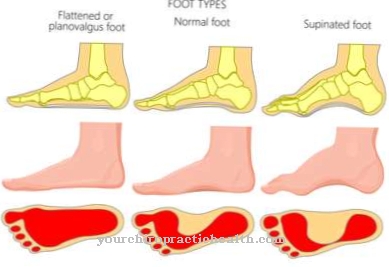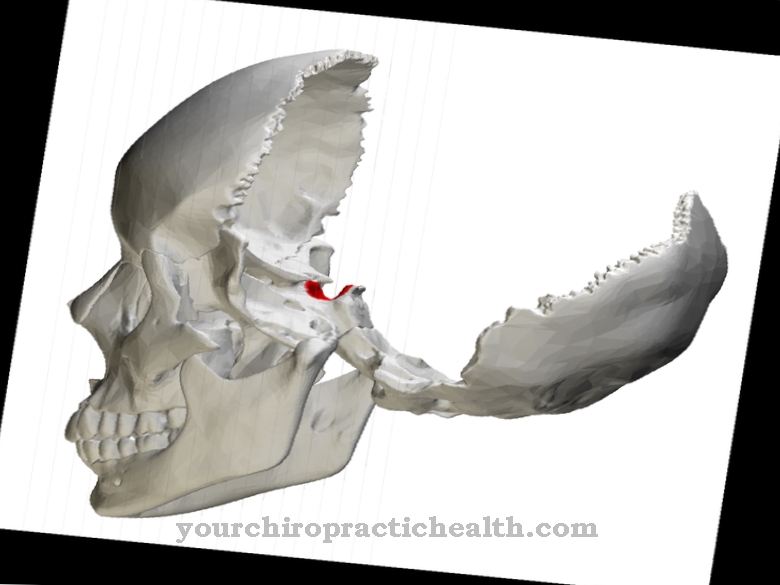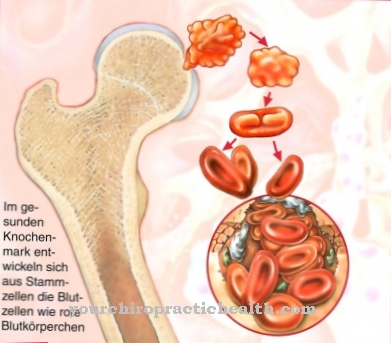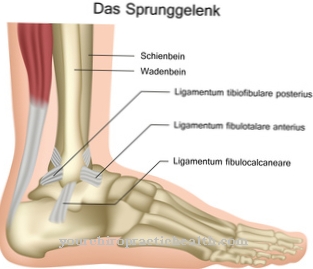As Neutropenia is a decrease in the number of neutrophils in the blood. Neutrophils play an important role in fighting off infections, so that neutropenia can lead to serious general illnesses.
What is Neutropenia?

© Sonja Birkelbach - stock.adobe.com
Neutrophils, also known as neutrophils for short, are the most common white blood cells (leukocytes). The specialized immune cells are part of the innate immune system. They are used to identify and eliminate pathogenic microorganisms. The neutrophils can absorb and digest the microorganisms. They act as phagocytes.
Furthermore, their granular vesicles contain various substances that can destroy bacteria and other pathogens. Furthermore, the neutrophil granulocytes can form the so-called NETs (Neutrophil Extracellular Traps).These are chromatin structures that bind microorganisms and thus render them harmless. These functions are with the Neutropenia Due to the lack of neutrophils, this is only possible to a limited extent.
Typically, one microliter of blood contains 1,800 to 8,000 neutrophils. With 500 to 1000 neutrophils per microliter of blood, there is moderate neutropenia. Severe neutropenia begins when the neutrophil count is less than 500 per microliter of blood.
causes
The cause of neutropenia can lie on different levels. On the one hand, reduced granulocyte production can be responsible for neutropenia. The most important cause of such an educational disorder is damage to the bone marrow. The bone marrow can be damaged by chemicals, poisonous plants or drugs such as diuretics, griseofulvin, chemotherapeutic agents, antibiotics, chloramphenicol or sulfonamides.
Infections can also cause bone marrow damage. Bone marrow damage often occurs after infections with parvoviruses, panleukopenia or feline leukemia virus. Immune-related or neoplastic bone marrow damage can also cause neutropenia. Examples of neoplasms associated with bone marrow damage are leukemia or myelofibrosis.
Increased consumption of granulocytes can also lead to neutropenia. Neutrophil granulocytes are particularly consumed in acute inflammation. If the demand exceeds the production capacity of the bone marrow, there is a decrease in neutrophils in the blood. A so-called left shift occurs for a short time, during which only immature neutrophils and their precursor cells are released over a certain period of time.
Neutropenia due to increased consumption occurs mainly in very serious diseases such as sepsis, metritis, or peritonitis. So-called dysgranulopoiesis can also cause neutropenia. In dysgranulopoiesis, the formation of neutrophilic granulocytes is disturbed. The cause can lie in the development cycle of the immune cells or in a reduced release.
Dysgranulopoiesis can be due to acute myeloid leukemia, AIDS, feline leukemia or myelodysplasias. Acute but only temporary neutropenia can be triggered by a shift of the neutrophil granulocytes into the neutrophil pool.
Such a shift is triggered by endotoxins or anaphylaxis as part of a severe allergic reaction. Congenital neutropenias are rare. Examples of such congenital neutropenias are Kostmann syndrome and glycogenosis type 1b.
Symptoms, ailments & signs
The shortage of neutrophils does not initially cause symptoms. The affected people are, however, much more susceptible to infection, as the immune system only functions to a limited extent due to the deficiency. In severe neutropenia, life-threatening infections can occur.
In addition, the patients feel tired, exhausted and weak. You have a fever, sometimes with chills. Painful ulcerations on the oral mucosa or gums are characteristic of neutropenia. Often these are caused by a fungal infection called candidiasis.
Diagnosis & course of disease
If there is an increased susceptibility to infection, the suspicion of a lack of leukocytes quickly arises. If the doctor suspects neutropenia, they will have a blood sample tested in the laboratory. The individual blood cells are counted in the differential blood count. In the case of neutropenia, the blood count shows a clear lack of neutrophil granulocytes. In severe cases, there are only 500 neutrophils per microliter of blood. Numbers between 1800 and 8000 are normal.
If the diagnosis is neutropenia, the cause must be identified as quickly as possible. The anamnesis and clinical examination provide information about the original disease. Other symptoms such as weakness, shortness of breath, bone pain or a feeling of pressure in the abdomen can indicate leukemia.
You may even be able to feel an enlarged spleen. A bone marrow biopsy can be taken from the pelvic bone to rule out a disorder of formation in the bone marrow.
Complications
Neutropenia carries a high risk of severe bacterial infections because the immune defense is significantly reduced due to the reduced number of neutrophils. Virus infection is no more likely, however. It is a clinical picture which, in addition to congenital causes, is often a complication of an underlying disease.
It can also be a result of taking certain medications or certain treatment methods. These risk factors can even lead to the complete loss of neutrophils with devastating effects. The complete absence of the corresponding granulocytes, also known as agranulocytosis, is characterized by a very severe clinical picture with chills, fever and a greatly increased heart rate. This is caused by a real bacterial invasion of the body with bacteria.
With the absence of neutrophils, the body's first defense against these intruders is also lacking. In addition to the fever and chills, the mucous membranes in the pharynx (throat), in the tonsils (tonsils) and even in the anal and genital areas die off. The whole thing is accompanied by local lymph node swellings. In the mouth area, painful canker sores develop in the form of aphthous stomatitis.
Agranulocytosis can in turn lead to life-threatening sepsis. In order to save the lives of patients, in addition to the use of broad spectrum antibiotics, strict protection against infection and the discontinuation of triggering drugs are required.
When should you go to the doctor?
Low blood pressure, fever, and chills are signs of neutropenia. Anyone who notices these symptoms should consult their family doctor. Medical advice is particularly needed in the case of complaints that appear to occur for no reason and are associated with physical discomfort. These cases may be caused by neutropenia, which, if left untreated, can cause further physical problems. If signs of infection are noticed, a hospital visit is recommended. People who suffer from the symptoms mentioned in connection with chemotherapy or radiation therapy should inform their doctor.
People with an immune disorder also belong to the risk groups and it is best to consult their family doctor quickly. The doctor can diagnose neutropenia and initiate treatment. People with a relevant medical history (low blood pressure, cardiovascular disease, etc.) should also seek medical advice. In addition to the family doctor's practice, the cardiologist or an internist can be visited. Depending on the cause, physiotherapists and alternative doctors may also be involved in treatment. Children are best presented to the pediatrician when the symptoms mentioned appear.
Therapy & Treatment
The therapy depends on the underlying disease. For symptomatic treatment, patients receive granulocyte-colony-stimulating factors (G-CSF). G-CSF is a peptide hormone that stimulates the formation of granulocytes. The drug is made either from E. coli or from CHO cells.
The four major cancer societies recommend preventive treatment with G-CSF when the risk of neutropenia is 20 percent. Reverse isolation may be required. Reverse isolation isolates people with weak immune systems. Staying in special isolation wards in hospitals is intended to protect patients from infectious diseases.
There are locks in front of the patient rooms on the isolation wards. Staff and visitors are only allowed to enter the rooms with protection and after certain disinfection measures. Irrespective of the symptomatic therapy, causal therapy must be carried out. If the neutropenia is caused by a severe infectious disease, the blood values will return to normal after the infection has subsided. On the other hand, diseases of the bone marrow require special treatment.
You can find your medication here
➔ Medicines to strengthen the defense and immune systemOutlook & forecast
Clarifying the cause of neutropenia is crucial for the further course of the disease and thus for the prognosis. Often the state of health is only determined after a long period of time. The patients mostly suffer from an increased susceptibility to infections, so that the actual diagnosis of neutropenia usually takes place very late.
The earlier the cause can be determined, the better the further course. Special therapy is necessary to treat the patient as best as possible. Drug therapy can significantly alleviate the symptoms. In addition, in some cases a bone marrow transplant is necessary in order to improve the general state of health.
A full recovery is not achieved in many patients despite all efforts. The treatment is associated with numerous complications, so that a cure is not always possible. The patient needs long-term treatment as well as regular medical checks so that the organism is supported as well as possible.
Since the disease is associated with a number of impairments, it represents an immense burden for the patient and their relatives. Everyday life must be adapted to the physical conditions. This often leads to the affected person reporting a reduced level of well-being in the long term and consequential psychological disorders are possible. Stays in isolated wards are often necessary to achieve improvements.
prevention
Most neutropenias cannot be prevented. If there is an increased risk with chemotherapy, G-CSF can be given preventively.
Aftercare
In most cases, the measures and options for follow-up care for neutropenia are significantly limited. For this reason, the person affected should consult a doctor immediately at the first signs and complaints of the disease in order to prevent the further occurrence of other complications and complaints. It cannot heal independently, so medical treatment is inevitable.
Most patients depend on regular checkups and examinations by a doctor during treatment in order to detect and remove further tumors at an early stage. In the case of neutropenia, the person affected should protect himself particularly well against various infections. Often the care and support of one's own family is very important, which can alleviate the development of depression and other psychological upsets.
The patient should rest and take it easy, refraining from exertion or physical activity in order not to unnecessarily stress the body. In some cases, neutropenia can also reduce the life expectancy of the person affected. Further follow-up measures are usually not available to the patient.

.jpg)




.jpg)


















.jpg)

.jpg)
